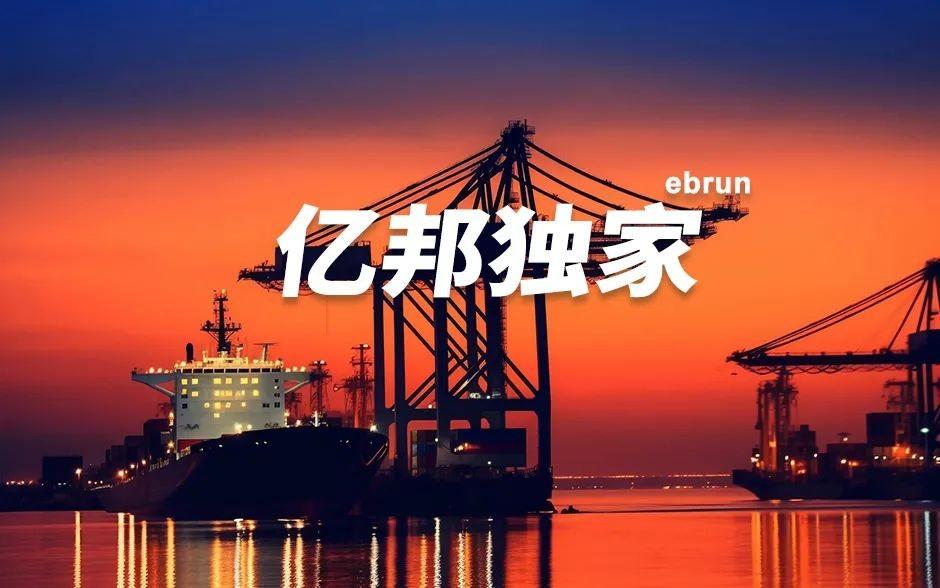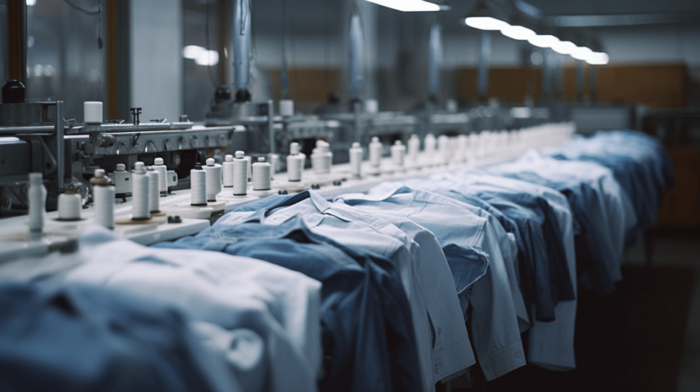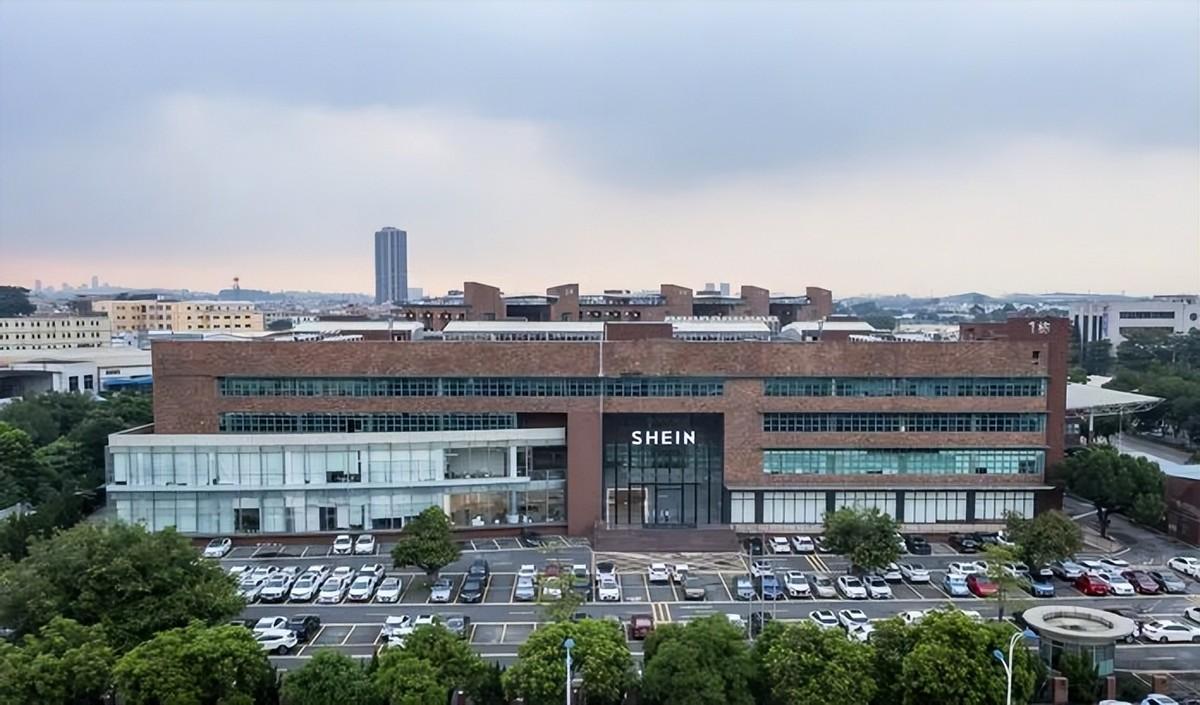Factories Involved in Cross-Border E-Commerce: Large Factories Disinterested in Full Service Management, Small Factories Unable to Operate Independently

By | Wang Haoran
Editor | He Yang
【Ebrun Original】"It's only November, the peak season, but many factories here have closed. No orders."
Ale operates a clothing factory with seventy to eighty employees in Guangzhou. For livelihood, he is considering taking on overseas orders from Southeast Asia and the Middle East, or entering the popular fully managed model for cross-border e-commerce.
In the past, he supplied goods to live broadcast sales on Douyin and Taobao, producing some mid- to high-end original clothing with a decent order volume. Due to the extended lockdown in Guangzhou last autumn and winter, local clothing factories were unable to operate normally, resulting in a shortage of domestic spring and summer clothing this year, creating high demand. "Starting from February, factories received various orders and went on a hiring spree, as if the goods would never be finished," Ale said. From March to June, his factory had to produce forty to fifty thousand pieces of clothing every month.
However, from July onwards, there was a "cliff-like drop in orders," "in the whole of July, the order volume decreased by one-third". "In order to snatch orders, everyone just kept lowering prices," Ale told Ebrun that it wasn't just domestic trading factories, but many foreign trading factories were also facing great difficulties.
This is not groundless. Customs data shows that China's foreign trade exports in October 2023 were 274.83 billion US dollars, a year-on-year decrease of 6.4%. It has been in a year-on-year negative growth trend for six consecutive months. Various commodity exports continue to fall year-on-year, and the decline in labor-intensive products such as textile yarn, fabrics and their products has been maintained at double digits for several months, and the decline in clothing and accessories has further widened. Foreign trade continues to be under pressure.
Whether it's a sharp decrease in domestic orders or weak overseas orders, factory owners have to consider new paths.
At the same time, "new variables" represented by Temu have stirred up the global e-commerce market like catfish, with extremely low prices. Various cross-border e-commerce platforms have successively launched "full service management" services, extending an olive branch to factories in the upstream supply chain.
The worry-free mode where factories only need to supply goods to get a share of the pie in cross-border e-commerce has attracted the attention of a large number of factories. A widely circulated image within the industry attests to this trend: after a speed-selling Alibaba full-service management investment promotion meeting, the staff was crowded by merchants who were eager to get onboard, and had to stand high to showcase their contact information. And in the TikTok Shop community, an official investment manager was often in contact with hundreds of people, with constant queries like "how to operate fully managed," "who to contact," and "how to verify."
However, after a year of the "fully managed" model running rampant, some issues need to be addressed: When factories get involved in cross-border e-commerce, which path, fully managed or independent operation, is the better path to take? As all major platforms move upstream, have factories truly enjoyed the benefits of "direct supply"?

01
Forced into reformation and the choice of two outward bound paths
Several factory owners described to Ebrun a highly severe industrial belt landscape: Price squeezing and style plagiarism are commonplace, and cost reduction by cutting corners and degrading materials is the order of the day.
Wangguan Network Technology is a company that deals in furniture and home products and has its own lamp factory. Lin Qianran, head of its foreign trade business, told Ebrun that in the lamp industry, a part of the same piece of a copper lamp they make is 12 cm, and competitors probably only make one that is 6 cm. "If you only look at the pictures on the e-commerce platforms, customers will perceive these two products as being the same."
Even for mid- to high-end products, they cannot escape the "bad money drives out good" situation. Wangguan Network Technology mainly sells mid- to high-end lamps, such as crystal lamps, luxury lamps, and modern lamps. Lin Qianran pointed out that for crystal lamps sold through offline channels, there are considerable requirements for the purity of the materials, and the transparency of the crystal can be clearly seen by distributors and consumers at a glance. However, when they are placed in pictures on the e-commerce platform, they are obscured, leading to a greatly diminished user experience and perception, which also results in the crystal lamps sold online often having relatively ordinary materials.
Product categories such as non-standard women's wear are even more prone to this phenomenon.
Before the rise of live broadcast e-commerce, Taobao was still the mainstream choice for consumers shopping online, "A well-established women's wear store on Taobao selling ten to twenty thousand pieces a month was pretty normal," Ale told Ebrun. Furthermore, Taobao has a relatively sound encouragement and protection mechanism for original products, putting the supply chain in a relatively benign state.
In recent years, the rise of live broadcast e-commerce has put "cost-effectiveness" and "low price" on everybody's lips, and presenters keep lowering prices. If approaching factories to directly produce goods, they will use cheaper fabrics and select small workshops with lower labor costs, leading to a high rate of unsatisfactory products. Ale pointed out that the return rate for some white-label garments sold on live broadcasts once reached 80%, "Live broadcast e-commerce is unfamiliar with quality control, and factories are squeezed for profit, and live broadcast salespersons are also not making money."
Since 2020, Ale has joined the ranks of suppliers for Douyin live broadcast e-commerce and has witnessed various phenomena among peer factories, such as comparing prices and plagiarism to grab orders, "Decreasing orders have led to fierce competition between factories, and mutual plagiarism has become the norm. For e-commerce customers, there is no such thing as original products."

Ale's factory mainly produces original women's wear that sells for several hundred yuan and has also been caught in the turmoil, "A hot-selling original product was copied by someone else just three days later." A few months ago, he saw a tight-fitting skirt suddenly become popular on Douyin and other short video platforms, and the identical product on Taobao was immediately sold out, leading to another factory producing the required molds the same night the bestseller was released.
"The domestic market is no longer sustainable, and transformation is absolutely necessary." a seller from a luggage production belt said.
Looking at the foreign trade industry, the structure of many racetracks is also worrying. "In China's second- and third-tier cities, there are numerous factories engaged in OEM/ODM business. With the rapid increase in labor and raw material costs, foreign trade orders have plummeted, and factory profits have become increasingly thin," Lan Youyang, founder of the cross-border brand overseas operation service provider Haiby E-commerce, said, "if a product has low added value and there is little differentiation, price competition will become very fierce."
He gave an example of how the average unit price of the main players in the bathroom shower system (shower) live sales greatly decreased from around 70 US dollars in 2021 to 35 US dollars this year, fully illustrating how squeezed the profits of the factories behind the product have become in a context of consumption downgrading, product homogeneity, and general price competition.
Lan Youyang stated that for foreign trade factories, reaching end consumers directly through cross-border e-commerce might be one of the best ways to break through.
A foreign friend of Ale told him that Temu and SHEIN were very popular and, seeing that many nearby factories were accepting SHEIN orders, he couldn't help feeling envious: "We have been considering whether to get involved and how to get involved this year."
Factories Getting into Cross-border E-commerce Retail Business: Two Main Paths
It can be seen that this year, various cross-border e-commerce platforms have been continuously attracting factories in industrial belts. They have not only launched a series of support policies but also set up dedicated personnel to visit industrial belts one by one.
For example, with the "fully managed" mode of investment attraction, platforms such as Temu, AliExpress, Lazada, TikTok Shop, and SHEIN have different requirements for upstream industrial belt factories based on market, platform characteristics, and business models. For example, AliExpress requires a business to have a minimum turnover of one million U.S. dollars and a trademark registration certificate or authorization letter for unregistered businesses; TikTok Shop prefers businesses to have experience in opening stores on other platforms. Different platforms also have preferences for different categories. "Overall, fully managed might be more suitable for small and medium-sized, mid-to-low-end products," says Lin Qianran.
Similarly, Amazon is also exploring upstream industrial belts, such as launching "Ten Ways to Start an Industrial Belt," to help factory-based businesses in areas such as business opportunities, brand building, localized services, talent cultivation, and branding.
Lin Qianran started her own business in May or June this year and opened stores on platforms such as Temu, SHEIN, Etsy, and Amazon. She mainly deals in small table lamps, light strips, and other small lighting products from external small factories. Currently, the stores on Temu and SHEIN have shown some progress, with around 10,000 orders per month. Starting from the second half of this year, she has clearly felt that many lighting factories in Zhongshan, Guangdong have started to consider transformation.
Qing Yong, from Shaodong Industrial Belt, runs a factory with less than 200 employees. He has chosen Amazon and embarked on the path of transforming from a factory to an independent brand. Currently, he has set up a research and development department in Guangzhou to strengthen e-commerce capabilities.
02
Fully Managed Has Not Killed Middlemen
Self-Operation for Factories Remains as "Mystery"
TikTok Shop once pointed out in a business event that the fully managed mode will be more favorable for factory-based and trade-oriented businesses, saying "Businesses can save time and energy to focus on optimizing products and developing production, and can fully utilize TikTok's traffic advantages to drive popularity across the entire internet. This will enable them to fully utilize and release the advantages of cross-border industrial chain".

This is a point that all fully managed platforms are emphasizing: Directly facing end consumers from the source factory, cutting off intermediate steps, and striving for a larger profit margin.
However, several industrial belt factories have told Ebrun that in this dual movement between factories and platforms, the advantage remains with trading companies.
Lin Qianran mentioned that in the lighting industry, many traders have a large volume and can lower factory prices with their scale. She has seen many such suppliers in Ningbo: they do not have their own factories but can handle large and small orders from fully managed platforms through their strong sourcing and docking capabilities.
These traders have a rich variety of SKUs, have deeper contact with upstream industrial belt factories, and can place orders with large factories through stocking up on multiple categories of goods and receive small fragmented orders, matching the fast response capabilities of small factories. Even under extremely low prices of fully managed platforms, these traders can still earn a decent profit.
This is to some extent due to the mismatch between the platform and the factory.
For platforms, ensuring the supply of goods and the richness of SKUs is the foundation for supporting the scale of a mall. It has been reported that all major fully managed platforms are still in a shortage of supply, especially TikTok Shop. A research note from Guoxin Securities mentioned that Temu requires buyers to discover business opportunities, review, list, and replenish stocks for all products. Assuming that each buyer can cover a maximum of 5,000 SPU (a class of attributes and similar characteristics) for daily operational maintenance. After calculation, Temu's maximum SPU is 2.76 million, and the lack of product variety is unable to meet the needs of some users, thereby lowering the platform's GMV ceiling.
"Any platform needs to establish a broad supply chain in the initial stage, so cooperation with traders with large SKU volumes definitely has an advantage," Lan Youyang pointed out. "Now, the fully managed mode is still in the stage of barbaric growth, and breadth is sought before precision."
"Platforms want us to put up all kinds of lamps, so that our stores become a unified style lighting store." Lin Qianran also mentioned that platforms hope that their store categories can be more complete, "But to achieve this level for a factory, a large number of personnel are needed, materials must be sufficient, and funds must be strong."

She pointed out that in the lighting industry, these large factories are basically accepting bulk orders for foreign trade purchases in the first half of the year, and have already prepared for the second half of the year, which has occupied the inventory, and the orders they accept in the second half of the year are for the next year. In September this year, Lin Qianran visited a large factory, and the boss told her that there was no stock now—for the peak sales periods such as Halloween and Christmas, the goods prepared early in the first half of the year have already been sold out, and their factory is on holiday.
"The demand for goods in the fully managed mode (is small), which for large factories is far from enough. Most factories hope to receive a large order at once so that production lines can keep running, which is the lowest cost for them," Lin Qianran added.
Ale also pointed out: "It is difficult for large factories to adopt the fully managed mode. Large factories have a clearer management of inventory and will not stock up due to fully managed business. Moreover, they have higher requirements for quality, and their average unit price is relatively high, so they will not lower prices for small orders."
In other words, the characteristics such as "quick reaction to small orders" and "continuously fragmented orders throughout the year" corresponding to the fully managed platform are not only a new challenge but also an attraction that is not compelling enough for these factories accustomed to large order production.
Although fully managed platforms are attracting suppliers with advantages such as "pure supply, hands-off management, and stress-free sales," there are still some gaps for factories.
"Compared with the self-operation model of opening a store on Amazon, the fully managed mode indeed solves many problems, but some skills in product selection and supply chain are still difficult for many factories to figure out in the short term," Lin Qianran said. "Some factories, after seeing a client’s large shipments, have directly started to do fully managed mode themselves. This situation often occurs, but I (as an intermediary trading company) am not worried at all."
"Currently, few factory personnel truly understand cross-border e-commerce, let alone full process self-operation. If you form a team and try for six months, you still may not make it,” Ale said.
Even though there are buyers and assistants to help factories, guide product selection, listing, and operation, most of the time, factories still face situations such as “can't find a buyer/assistant” and “too many merchants to handle”.
Not to mention the operation talent, even for basic production line workers, many factories are still struggling with long-term labor shortages. Ale told Ebrun that he raised the wages of his workers to over 100,000 RMB per year, but still couldn't recruit new employees.
"Young people born in the 1990s and 2000s generally don't like to work in factories." Lan Youyang believes that in the next five to ten years, only medium to high-end value manufacturers will most likely survive. “The few top-notch research and development personnel are quickly moving to super large factories or brand merchants. Small and medium-sized factories are lacking versatile product managers and research and development teams who understand the market and products, which leads to serious product homogeneity and can only compete on price. Once costs rise, they cannot maintain their meager profits.”
This also explains why traders still have an advantage even with full outsourcing in prevalence.
In addition, despite numerous platform investment promotions and merchants running to visit each industrial belt, it is still difficult for them to penetrate the market deeply. Qing Yong told Ebrun that in the Shandong bag manufacturing belt where he is located, a small county in Hunan developed due to the supply chain transferred from Huadu, Guangzhou in the 1990s. There are rarely investment promotions from cross-border e-commerce platforms in such industrial belts. Only traders who understand the local ecosystem can truly contact the original factories.
As a result, these factories often struggle with transformation, lack awareness, and are unwilling to believe in operational service providers. Some silent small and medium-sized factory owners share a common image: in their forties or fifties, they only know to start production when orders come in, and find it "too much trouble" to add products if they want to recruit a few people.
Both full outsourcing and the higher-demand self-operated mode present challenges. Lan Youyang summarized the issues that factories need to consider:
1. Is there a determination to enter the long-term investment, long-return retail format of cross-border e-commerce — investments and returns occur at different periods and require setting the highest tolerable range for floating losses;
2. Recognizing the changes in the production mode—transitioning from large, slow orders to small, fast orders, from muscle-type orders from the factory end to fragmented orders, and transitioning from a push-based and pull-based supply chain to a digital supply chain;
3. Understanding the need for global external collaboration capabilities, such as how to choose customs clearance, tax declaration, backend transportation, overseas warehousing service providers, etc.;
4. Whether there is cost and risk control capabilities—understanding the fixed team expenditure costs, account risks, inventory risks, product quality risks, IP infringement risks, etc.;
5. How to calculate the financial aspect of retail? Different from traditional B2B where net profit margin is the primary indicator, turnover rate is a more important factor in the retail industry.
03
Self-operation and full outsourcing are not a dilemma of either-or
Stable profits are the ultimate pursuit
AliExpress has stated in investment promotions that full outsourcing services are an expansion of their original platform mode. Businesses with outstanding operating capabilities or brand opening businesses can choose to operate their own stores; if a business has stock advantages but is not familiar with operation and after-sales, they can choose full outsourcing and be a "hands-off shopkeeper".
"In terms of the current platform traffic allocation mechanism, full outsourcing is currently in a period of the greatest dividends. If you have supply chain capabilities and insights into exploring foreign markets, or you can recruit such talents, full outsourcing will definitely be the first choice." A toy factory owner who does full outsourcing business on AliExpress stated.
In his view, whether to operate a self-operated store or full outsourcing is a matter of whether the factory's capabilities, needs, and ecological position match.
Over the past decade, SHEIN has created an agile and flexible supply chain model with an initial order quantity of only 100 to 200 units for each SKU. It decides on production orders through rapid product testing, which largely avoids inventory problems, and with very fast new product releases, extremely low prices, and powerful supply chain capabilities, it has overtaken fast fashion giants such as Zara and H&M.

Around 70% of the factories around Ale are undertaking orders from SHEIN. Since the emergence of Temu, many SHEIN suppliers he knows have started supplying goods to Temu with the goal of clearing stock: "Our upstairs supplies SHEIN. Last year, we prepared two million worth of goods, we did not sell them, so we brought them to Temu to clear."
SHEIN's credit term is only 15 days, which is a sweet spot for factories, but the extreme cost reduction also places higher demands on the factory. "SHEIN specifies fabric suppliers, and the production cost of a dress must be controlled to be no more than 35 RMB. Applied to the factory owner, the profit from a dress might not even be 1 RMB." Ale said.
Factories need to consider whether they can control costs and obtain the minimum profit under the full outsourcing model's extremely low-price, dynamic competition mechanism. Lin Qianran estimates that she may need to achieve a 30% profit margin at Temu to have room for profit.
"The inability to control pricing is not something every company can accept," Lan Youyang says. "If a company is confident in its product strength, has plans for brand building, strategic long-term development, it should not easily accept full outsourcing." In his view, establishing a brand is itself a long-term battle, and maintaining control of pricing is what enables the entire brand operation chain to form a controllable closed loop.
However, for some factory-type sellers, low prices may mean more stable revenue.
"Full outsourcing, I define it as a completely new sales channel. Every product has a life cycle, and once it enters the decline phase, inventory becomes the most troubling thing. But this inventory can still be sold through full outsourcing." A factory-type seller who does full outsourcing on AliExpress mentioned that after calculating the cost of supply to the platform and maintaining the supply cost, profits are more stable, "while self-operated platforms have to add shipping costs, and incurring after-sales promotion, and labor costs are uncontrollable."
Lan Youyang pointed out that doing cross-border e-commerce self-operated or full outsourcing poses different situations for factories:
1. Under the full outsourcing model, only by continuously compressing costs can factories avoid being eliminated in the endless price war. For factories with limited actual strength and temporarily unable to establish a brand, if they can accept small profits but more sales and have cost advantages, full outsourcing is a temporarily safe route;
2. If a factory is supplying to large European and American sellers, or are supplying to chain supermarkets like Walmart, half of the conditions have been met. All that remains is a mature development and operation team, then they can open a store on Amazon for self-operation;
3. If a factory's products have little sales in various cross-border e-commerce channels, mostly relying on traditional offline customers for orders, traditional foreign trade is still more suitable. By solidifying products, returning to the essence of business, then slowly seeking new business opportunities.
Aluo’s consideration is to supply goods to overseas "local stores" on cross-border e-commerce platforms or enterprises operating localized businesses abroad. "Opening local stores is the general trend of cross-border e-commerce. Even if they need to organize overseas local goods, they still need a supply chain from China. We hope to find such customers and supply them directly," he said.
(The names Aluo and Qingyong are pseudonyms)
[Copyright Notice] Ebrun advocates respecting and protecting intellectual property rights. Without permission, no one is allowed to copy, reproduce, or use the content of this website in any other way. If any copyright issues are found in the articles on this website, please provide copyright questions, identification, proof of copyright, contact information, etc. and send an email to run@ebrun.com. We will communicate and handle it in a timely manner.
Translated by AI. Feedback: run@ebrun.com
